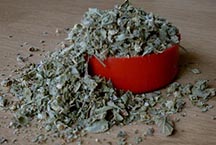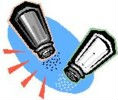Make the most of culinary herbs and spices.
Other articles you might enjoy:
3. Guidelines for Seasoning with Herbs and Spices
4. A Handy Glossary of Herbal Terms
Storing Dried Herbs and Spices
by Sandra Bowens
Here's one that's full of our favorite recipes because we wrote the book! It is also full of information, helpful hints and ideas for using herbs and spices in your kitchen.
Hanging a spice rack full of clear glass jars conveniently above the stove is the worst possible thing you can do to your spice collection. Heat, light and age are the enemies.
Consider dedicating a cabinet or drawer to your spices. Locate one as far away from the stove (but not above the refrigerator or coffee maker) as possible. Make sure the sun doesn't give the cabinet a direct hit everyday.
If you choose to buy in bulk, double-bag any extras in plastic ziplocks. Store these bags in an airtight container in a cool, dark place. Spices such as turmeric, curry powders, ground cloves and paprikas should be kept in glass or tin: they will "melt" plastic over time.
Buying in bulk means you provide the storage vessels. Keep an eye out for small jars or nifty spice containers whenever you shop. Look for dark colors and tight-fitting lids.
You will often hear that you should replace your spices every six months or so. Can anyone out there afford to do this? Check quality and potency with your nose. If the seasoning in question isn't vibrant, replace it. Seeds, like sesame and poppy, will go bad if kept too long. Again, your nose will tell you in an instant because of the heavy rancid odor.
Protect your spice collection from the enemies. The best way to avoid having to toss out your seasonings is to use them up. Better to replace the empty bottle than to throw out an inferior product.




